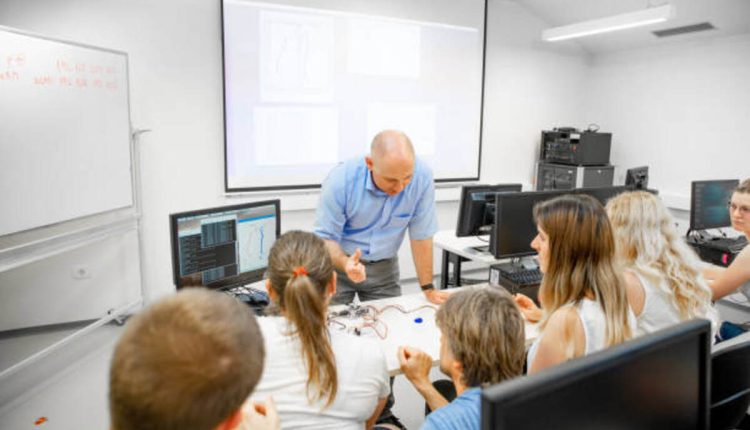Introduction to Computer Engineering
The Bachelor of Science in Computer Engineering curriculum gives pupils a thorough understanding of both software and hardware aspects of computing systems. The bs computer engineering curriculum combines principles from computer science and electrical engineering to create, develop, and optimize computing systems and technologies.
Foundational Courses
Mathematics
Students are required to take foundational mathematics courses like discrete mathematics, linear algebra, and calculus. These courses provide the mathematical background necessary for advanced computer engineering concepts.
Physics
Physics courses cover topics such as electricity, magnetism, and optics, providing students with a fundamental understanding of physical principles relevant to computer engineering.
Introduction to Computer Science
This introductory course introduces students to fundamental concepts in computer science, including programming languages, algorithms, and software development methodologies.
Core Computer Engineering Courses
Digital Logic Design
Students learn the principles of digital logic design, including Boolean algebra, logic gates, and sequential circuits. This course lays the groundwork for understanding the design and implementation of digital systems.
Computer Organization and Architecture
This course covers the organization and architecture of computer systems, including CPU design, memory systems, and input/output mechanisms. Students learn about different instruction set architectures and their impact on system performance.
Embedded Systems
Embedded systems courses focus on the design and development of computing systems embedded within electronic devices. Topics include microcontroller programming, real-time operating systems, and interfacing with external devices.
Data Structures and Algorithms
Students study fundamental data structures such as arrays, linked lists, stacks, queues, trees, and graphs, along with algorithms for sorting, searching, and graph traversal. This course emphasizes problem-solving skills and algorithmic efficiency.
Computer Networks
This course covers the principles of computer networking, including network architectures, protocols, and technologies. Students learn about the design and implementation of local area networks (LANs), wide area networks (WANs), and the Internet.
Specialization Tracks
Students may choose to specialize in either hardware or software tracks based on their interests and career goals.
Hardware Track
The hardware track focuses on the design and implementation of digital and analog electronic systems. Courses may include VLSI design, digital signal processing, and hardware description languages.
Software Track
The software track emphasizes software development and programming skills. Courses may include software engineering, operating systems, and programming languages such as C++, Java, and Python.
Elective Courses
Students have the opportunity to choose elective courses based on their interests and career aspirations. Elective courses may cover advanced topics in computer engineering, such as artificial intelligence, machine learning, cybersecurity, or cloud computing.
Capstone Project
In their final year, students complete a capstone project that integrates knowledge and skills acquired throughout the program. Working in teams, students design and implement a significant computer engineering project under the guidance of faculty mentors.
Internship/Industrial Training
Students are required to complete an internship or industrial training program to gain practical experience in a professional setting. This hands-on experience allows students to apply classroom knowledge to real-world projects and develop professional skills.
Professional Development and Ethics
Throughout the program, students participate in activities and seminars focused on professional development and ethical considerations in computer engineering practice. Topics may include ethical decision-making, professional responsibilities, and societal impacts of technology.
Conclusion
The Bachelor of Science in Computer Engineering curriculum equips students with the knowledge, skills, and practical experience needed to succeed in the dynamic field of computer engineering. By providing a balanced curriculum encompassing both hardware and software aspects, the program prepares graduates for diverse career opportunities in industries such as electronics, telecommunications, software development, and embedded systems.
FAQs (Frequently Asked Questions)
What career opportunities are available to graduates of the Bachelor of Science in Computer Engineering program?
Graduates of the program can pursue various career paths, including hardware design engineer, software developer, systems analyst, embedded systems engineer, network engineer, and cybersecurity specialist.
Is the Bachelor of Science in Computer Engineering program accredited?
Yes, reputable institutions often seek accreditation from recognized accrediting bodies to ensure that their programs meet rigorous academic standards and prepare students for professional practice.
Can I pursue further studies after completing the Bachelor of Science in Computer Engineering program?
Yes, many graduates choose to pursue advanced degrees such as Master of Science in Computer Engineering or related fields to deepen their knowledge and specialize in specific areas of interest.
What skills are essential for success in the field of computer engineering?
Essential skills for computer engineers include strong problem-solving abilities, proficiency in programming languages, understanding of hardware and software systems, effective communication skills, and the ability to adapt to new technologies.
How can I learn more about the Bachelor of Science in Computer Engineering program and admissions requirements?
Prospective students can visit the official website of the institution offering the program or contact the admissions office for detailed information about the curriculum, admissions process, tuition fees, and financial aid options.
Read also: Pragati Learning In India











Comments are closed.